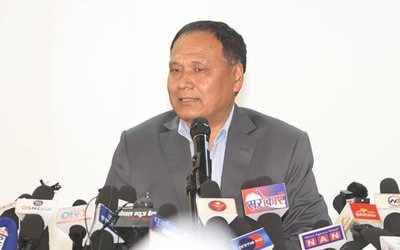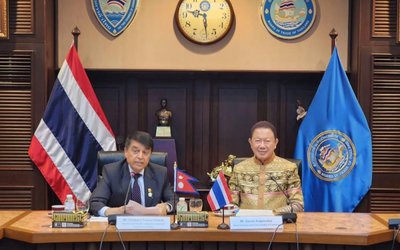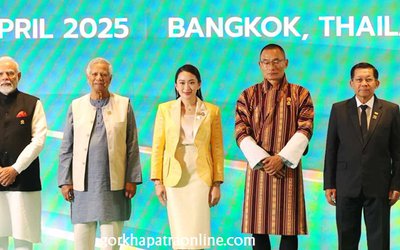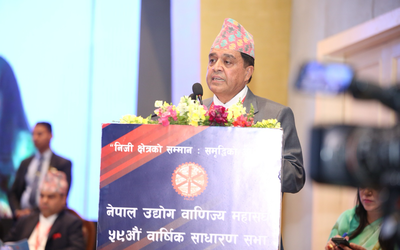
Senior Economists, representatives of the private sector, Bankers and other expert-stakeholders discussed on economic aspects of the draft constitution and their implications for the country. The discussion was organized by South Asia Watch on Trade, Economics and Environment (SAWTEE) to gather experts' opinion and prepare a set of suggestions for country’s economic system to be proposed in the upcoming constitution.
Dr Posh Raj Pandey, Chairman, SAWTEE, highlighted the provisions of the draft constitution that have implications to the economy and economic system. He said that the provisions of the constitution should be instrumental for the creation of prosperous and just Nepal. “But the draft—that will write the fate of generations to come—includes several contradictory provisions which may obstruct economic and social transformation as dreamed during the people’s movement ”, he added. He pointed out that we have not assessed the financial obligations created to the state—as well as in defining governance structure and state apparatus—in ensuring rights, such as that of free health and education, of employment and food security, among others, enshrined in the rights of the citizens. He also questioned whether the cooperatives sector is a part of the private sector or an independent sector as provided in the draft. He opined that it would be unjust to an individual entrepreneur to provide in the constitution a provision to treat cooperatives specially and differently without any regulations, but regulate the private sector. He also cautioned that assigning banks and financial institutions to the federal states as well would create jeopardy in the financial system and its stability. He further said that the draft fails to maintain coherence with Nepal’s commitments at the international, regional and bilateral levels, such as providing national treatment to foreign investors.
Pashupati Murarka, President, Federation of Nepalese Chambers of Commerce and Industry (FNCCI), demanded that the ‘socialist’ word used in the draft should be termed ‘democratic socialism’ as there is no possibility for Nepal to deviate from the market-led economy. He was of the view that the draft talks about the rights of the laborers while it is silent on the rights of the private investors. He demanded that the constitution should explicitly mention that no industrial property will be nationalized. He further opined that the centre should have all the rights of imposing indirect taxes and income taxes so that duplication of taxes will be avoided. He further opined that the prerogative rights on the natural resources conferred on the locals proposed by the draft will deter investment in harnessing natural resources.
Dr Shankar Sharma, Former Vice Chair, National Planning Commission (NPC), was of the view that the central government should make investments on important sectors such as education, health and agriculture for equitable and sustainable development of these sectors that are the backbone of development for any country. He suggested that state’s obligations on sectors such as health and education should be based on state’s ability to provide such services as directive principles on progressive realization that the state can ensure such services on the basis of economic viability.
Dr Yuba Raj Khatiwada, Former Vice Chair, NPC and Former Governor, Nepal Rastra Bank (NRB), was of the view that the constitution should not be like a ‘plan document’ of the government. He was of the view that when the constitution tries to cover so many topics the main focus gets diluted. He also pointed out that the issues that should be covered under ‘social security’ have been included in the fundamental rights which will pose an unlimited responsibility of the state coffers at the cost of capital formation. He opined that the private property should not be nationalized by the government while the natural resources should be owned by the state. He also suggested that the cooperatives sector which has emerged as a very important segment of the Nepali economy, particularly in rural areas, should be viewed as one of the pillars of the economy. He further suggested that the new constitution should also include air space of Nepal as the country’s territory.
Hari Roka, former Member, Constituent Assembly (CA), shared his experiences—along with Dr Sharma—of writing the draft during the first tenure of the CA. He opined that the state must have bigger obligations to its people and only socialism can ensure welfare state in Nepal.
Similarly, Deependra Bahadur Kshetry, Former Member, National Planning Commission, and former Governor, NRB, said that socialism is the ultimate stage which can be reached by way of the development of capitalism that guarantees welfare to citizens. It is good that the draft encompasses the notion of socialism.
Participants of the discussion further opined that the draft is inconsistent and incoherent in it and has not prioritized sectors for economic development. It was agreed that the draft should be simple and should not be too subjective that my make it impossible to implement. It was agreed that the federal states have been proposed without a proper homework on the overall economic efficiency. Furthermore, the institutional mechanisms and provisions envisioned by the draft are too costly for Nepal which may erode competitiveness and productivity of the economy, and escalate the cost of doing business.
According to a press release issued by SAWTEE, They viewed that it is also silent about the movement of capital, and does not talk about the security of the private sector. They said that it is also not able to adequate reflect the issues important for enhanced productivity of land, one of the important economic factors of production. Participants also viewed that the constitution should have provision of proper audit of political parties.
Dr Prithvi Raj Ligal, Former Vice Chair, NPC, speaking as the Chair concluded that the draft should lay the foundation for prosperous Nepal. It should not deter the economic development process. At the same time it should be efficient to address the aspirations of the people, more so of the poor and excluded segments of the society.
Altogether 39 experts participated in the discussion. The suggestions will be submitted to the constituent assembly on 21 July 2015.
- NEPAL-THAILAND: Joint Business Council
- Apr 13, 2025
- BIMSTEC SUMMIT: Nepal’s Stand
- Apr 11, 2025
- IME GROUP: Expands Into Paper Industry
- Mar 24, 2025
- CPN UML: Instigated By India
- Mar 23, 2025
- ADB’S CHIEF ECONOMIST: Nepal Reduces Poverty
- Mar 11, 2025















